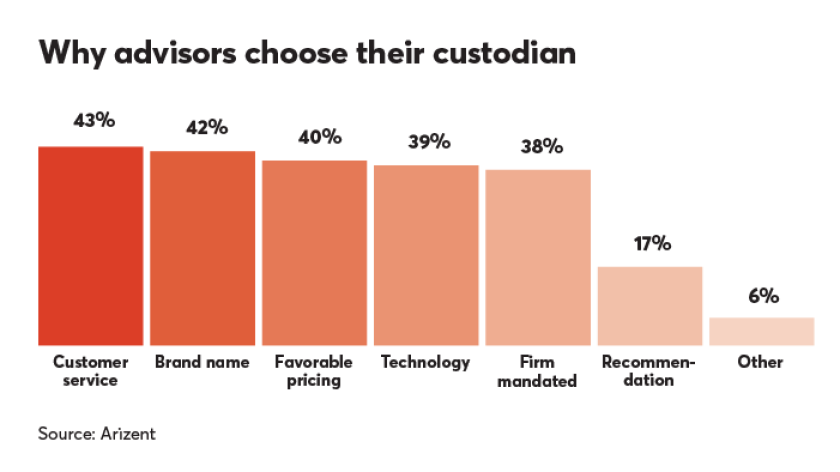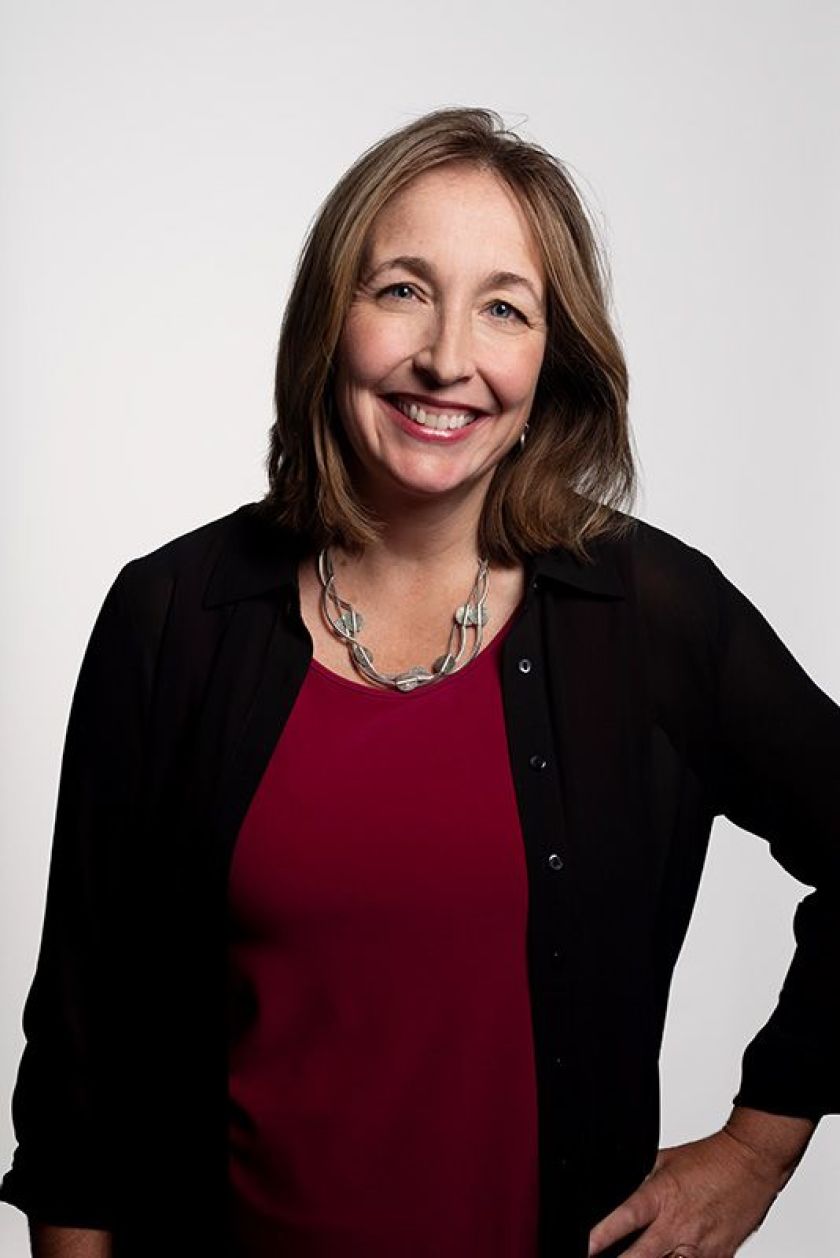
Advisor Sheila Padden never had a complaint with Charles Schwab, her custodian of five years. That is, until last year.
Padden doesn’t have her own client service team and relies on one of Schwab’s call centers. It has historically been responsive; the company “tends to run a pretty tight ship,” she says. Around November, that started to change.
“I had to just be prepared to be on hold for 45 minutes,” Padden says. “If I didn’t have the time, then I just shouldn’t make the call.”
As Schwab, the largest player in the market, focuses on its merger with TD and handles unprecedented volume and net new assets, smaller custodial competitors see an opportunity to attract financial advisors joining the RIA channel, or, in some cases, unhappy firms looking to move their books of business.
There are more than a dozen small players in the RIA custody marketplace. They range from self-clearing firms to trust companies to front-end custodians sitting on top of third-party clearing platforms. While these players may be overshadowed by Schwab’s sheer size — the company serves 13,000 RIAs — these small custodial firms are re-thinking the settlement process, testing new pricing models, and improving advisor efficiency and service.
This moment is their opportunity to shine, they say.
“Crisis absolutely accelerates change,” says Jason Wenk, founder and CEO of Altruist, a custodian that launched in 2020 and now serves more than 600 RIAs, clearing trades via Apex Clearing.
Industry in flux
Steady growth, the dominance of a few firms and the challenges of winning new business have historically characterized the custody market as firms fought for RIAs’ burgeoning business.
From 2009 to 2019, RIA assets grew from $2 trillion to $5.7 trillion, according to data from Cerulli Associates. And for decades a handful of firms have shaped the custody business: Charles Schwab, Fidelity Investments, TD Ameritrade and BNY Mellon Pershing.
“They were the leaders in innovation from a technology perspective to get to the scale that they are at today,” says Noel Stave, COO of RBC Clearing & Custody, referring to Schwab, TD and Fidelity.

Because moving a book of business from one custodian to another requires a lot of work, advisors tend not to do it frequently. That hurdle heightens competition between custodians for business from new entrants to the RIA channel — as well as to entice advisors to place their clients’ assets at multiple custodians.
But the market has been changing. In the last two years, two smaller players were scooped up, as Morgan Stanley and Goldman Sachs bought E-Trade Financial and Folio Financial, respectively. The biggest change came when Schwab purchased TD Ameritrade, the third largest custodian in the industry, creating a $3.1 trillion behemoth.
“That quiet, old custodial business. … Has seen quite a lot of change over the last two years. And that’s going to continue,” says Dan Skiles, president of custodian Shareholder Services Group, which clears through BNY Mellon Pershing and services more than 1,700 financial advisors.
Service problems
Padden and other advisors have expressed some frustration with service at Schwab in recent months.
“What used to take one to two days now takes three to four days,” says Tyler Smith, COO of Garrett Investment Advisors, an RIA with more than $270 million in assets at TD Ameritrade.
Service problems seem to be confined to RIAs who use call centers. Three RIAs that have designated service teams at TD Ameritrade or Schwab told Financial Planning they had not experienced any service issues last year or in recent months.
“We haven’t noticed any difference over the last two months,” Jim Gladney, CEO of $1.6 billion wealth management firm Portfolio Solutions and $175 million RIA Liberty Wealth Advisors, said in February.
A Schwab spokesman said the company is working to address specific issues and resolve them. “Our service times have not been where they should be in recent weeks,” the spokesman said in an emailed statement in February. However, he said that the service gaps are not related to the Schwab-TD integration, but connected to advisors’ rapid growth recently.
“We have been actively and rapidly adding additional resources to assist as quickly as possible to address the unprecedented volumes we are seeing,” he said in an email, noting that “our hold times have improved/stabilized even against continued volume” since December.
Is there an opportunity for small custodians to entice away many RIAs from Schwab? Maybe not. Several advisors served by service centers who spoke with Financial Planning had no plans to take their business elsewhere, saying they have been generally happy at Schwab and TD Ameritrade.
Custody assets tend to be fairly sticky. Re-papering client accounts and learning new technology and platforms can be a big lift for financial advisors, according to Brian Lauzon, managing director of InCap Group, an RIA M&A investment bank.
“The last thing any RIA wants to do is change custodians,” he says. “It’s a herculean process.”
For these reasons, small custodians say they aren’t anticipating a mass exodus from Schwab and TD Ameritrade.
“I don’t think that many advisors are going to leave,” Altruist’s Wenk says.
However, there is an opportunity to stand out to new business: financial advisors getting started in the RIA channel or are looking to add another partner to their multi-custodial businesses. There’s also an opportunity to help financial advisors new to the business altogether.
“We’ve gotten way more visibility around SSG in the last year than ever before, and we actually decreased our marketing budget dramatically,” Skiles says, noting that SSG is onboarding approximately two advisors a week.

RBC Clearing & Custody signed on 50 new RIAs — 58% growth in clients — between August and December 2020, according to the company. By the second week of February, RBC had added about 20 more, according to Stave.
“We just continue to grow,” he says.
Paul Ferry, an advisor who had held $25 million in client assets at TD Ameritrade and Schwab, moved his book of business to RBC Clearing & Custody approximately six months ago, largely because of the hands-on attention he says he receives there.
“As a small RIA, you need to be able to talk to somebody,” Ferry says. “They really hold my hand in terms of coming over and building my business with them.”
Key innovations
Innovative new technologies and better service models being pursued by small custodians will help advisors on their platforms excel, executives say.
Firms are also focusing attention on the infrastructure of custody itself, on capabilities like direct indexing, and on speeding up trade settlement.
Custodians that clear their own trades are responsible for fronting deposits with clearinghouses, the organizations operating under the SEC whose role is to protect the marketplace, which requires capital. They’re also responsible for the inner workings and recordkeeping of the trades and protecting the assets.

Apex Clearing
“The vast majority of our spend has now shifted from frontend work to backend work — to regulatory, to compliance, to reporting, safety and soundness, and customer protection,” says Stave. “That’s where we can make a difference. That’s our secret sauce. We can do things there that a smaller fintech firm have the resources to deal with.”
Apex Clearing, which supports platforms including Altruist and FusionIQ and recently announced plans to go public, is focused on moving money between channels more quickly, according to Tricia Rothschild, president of Apex Clearing.
“If we’re going to have speed bumps along the way to investing, they should be speed bumps that we get to choose, not speed bumps that the system imposes on us,” Rothschild says.
Trade settlement is a two-day process. While the time it takes has shortened, “I just think there’s room for improvement,” Rothschild says.
Apex is also reducing the time it takes to open accounts, which she says it can perform in fewer than 10 minutes.
Custodians that use a third-party clearing firm to settle trades, including Altruist, TradePMR, and Shareholder Services Group, are making improvements to advisor support, user experience and daily workflow.
Altruist is simplifying and streamlining account opening, funding, trading, reporting and billing processes for advisors, according to Wenk.
“What we’re trying to do is take these typical points of friction that an RIA would have and really listen to our users,” Wenk says. Altruist is building digital check deposit capabilities as well as a single unified billing system that addresses multiple types of charging.
When advisors choose a vendor, they have to look at both the front-end partner as well as the clearing firm operating on the back-end.
“If you look at competitors like us, it’s an important question: Who do you clear with? And how long have you been with them?” Skiles says.
Should a front-end custodian switch underlying clearing firms, it can be disruptive for advisors, Skiles says. The process includes negative consent letters that go out to clients.
“It certainly can be done. It’s not something that you can’t accomplish, but it does require a lot of work,” Skiles says.
‘A very different relationship’
Smaller custodians also say that they can offer more personalized customer service to RIAs, and that they are adding upgrades to make their support services more efficient.
“If someone’s working on a complex transfer from another custodian to us, we’ll have them speak to the person doing the actual work,” Skiles says.
The average employee has been working at SSG for 19 years, according to Skiles, which has helped RIAs establish a relationship with the person serving them.
“Being able to deliver that consistent strong relationship makes a huge difference,” he says.
At Altruist, Wenk has tried to take a software-as-a-service strategy to its support for financial advisors. Most of their service requests come via chat, Wenk says, and advisors are connected to someone “typically within a minute or less.” They can then jump on the phone or screen share, he says.
“They know our service people by name. They follow the people on our team on social media individually. It’s a very different relationship,” Wenk says.
Pressured economics
Custodians are fighting for market share as some sources of revenue shrink, particularly after some players eliminated commission fees and the Fed cut interest rates.
In an industry where revenue on client assets is small, scale is important. Schwab and Fidelity reap the benefit of sheer size.
Schwab is investing more in its advisor technology than ever before, according to Bernie Clark, head of Schwab Advisor Services. It is developing a tech platform that will harness both TD Ameritrade and Schwab’s capabilities into one superior platform.

RBC Clearing & Custody
“Now we’re in a position where we’re talking about trillions of dollars,” Clark says. The company is leading the custody market “with the girth of Charles Schwab behind it, with the bank presence behind it, with the commitment [to financial advisors].”
Charles Schwab’ scale will help the company stay ahead of the curve when it comes to regulation and any upcoming market challenges, Clark says.
“Being a custodian is about capability. It’s about relationships, and it’s about being able to cover all the bases,” he says.
It remains to be seen how other companies with massive capital, such as Goldman Sachs and Morgan Stanley, will invest resources into their own newly-acquired custodians.
“I would love to be a fly on the wall of the Goldman custody strategy discussion, because there is something going on there,” RBC’s Stave says.
But small custodians say they’re not worried, and that there are plenty of RIAs out there in the market — a growing number, in fact.
“The group that we bet on way back when — independent RIAs — are thriving more today than ever before,” Skiles says.
Leave a Reply